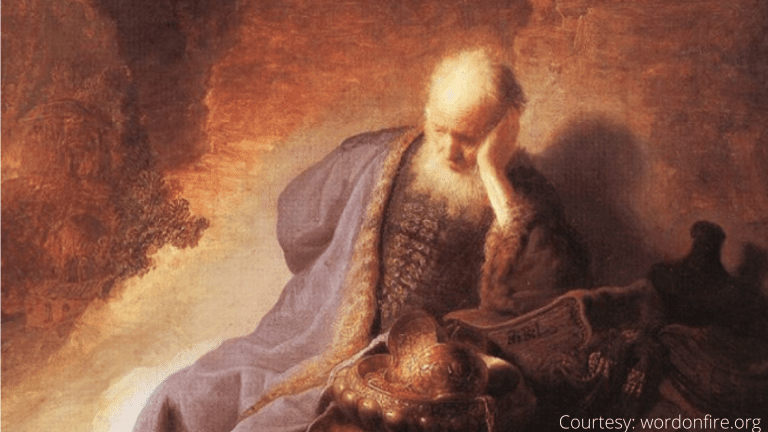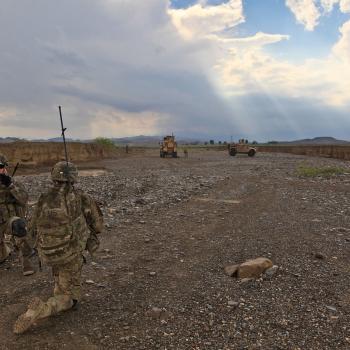
Monday: Read Revelation 8:1-13
Rev 8:1-9:21 may well be one of the most misunderstood sections within the book of Revelation. Since 5:1, the narrative of Revelation has led us to believe that the contents of the Scroll are important. In 8:1, we learn that the Seventh Seal is broken. We fully expect that we will now see the Scroll will be opened and its contents revealed.
In 8:2, 6-9:21, however, instead of learning what is on the Scroll, John introduces us to another series of seven: the Seven Trumpets. This suggests that the Seven Trumpets, like the Seven Seals, also indicate that God is delaying the end—the day when He will answer the prayers of the saints and bring justice (8:3-4).
In order to understand the account of the Seven Trumpets, we must note that the first four Trumpets, like the first four Seals, are clearly set apart from the last three (see 8:13). The first four Trumpets directly affect the four divisions of creation: the earth, the sea, the rivers and springs, and the sun, moon, and stars (7-12).
Another important feature of the 7 Trumpets is the theme of “decreation” (or the undoing of creation). This is seen in that the effects of the first four Trumpets reverse what God established in creation.
All of this indicates that the series of Trumpets do not relay God’s wrath on the earth—as is commonly understood. Instead, the Trumpets, in response to the prayers of the saints, represent a delay. The destruction that takes place on the earth in the account of the Seven Trumpets, then, in the same way as the first four Seals, represents what happens when God delays the end and allows human rulers to rule. In the first four Seals, human rule brought war, famine, and death to humanity (6:1-8). Now, in the first four Trumpets, human rule brings destruction upon the four parts of creation (the land 7; the sea 8-9; the fresh waters 10-11; and the heavenly bodies 12).[2]
Questions to ponder/discuss:
- One of the problems with suggesting that God causes the destruction is that it makes God no better than any human ruler. That is, if God is bringing the destruction in order that those who survive might see and repent, then His rule is no different than the nations. After all, the nations rule by force and they use power as a warning by which others are to be kept in line. Jesus explicitly told His disciples that they are not to rule like the nations (see Mark 10:42-45).
- We know that God rules through love. Do you think that understanding this passage in the manner that I have presented makes it easier to reconcile the God of the Bible (especially Jesus and the NT message) with the message of the book of Revelation?
Tuesday: Read Revelation 9:1-21 Eph 6:10-18
This passage continues the description of the Trumpets from yesterday’s reading. In 9:1-19, John narrates two demonic hordes that unleash pain and suffering among humanity.
The first demonic horde comes from the Abyss (1-2): note the “Abyss” is likely synonymous with hell—as is evidenced by the smoke that comes out of it (2-3). These demonic hordes are granted the authority to inflict suffering but not death upon humanity (4-6).
The second demonic horde kills one-third of humanity (18). Note: they do not represent 200,000,000 soldiers (which almost every major English translation except the ESV says) because the number in Greek is 2×10,000’s (plural) x 10,000’s (plural). The number simply represents an unfathomable amount.
The war which these demonic beings wage will be described in the “Armageddon” passage in 16:12-16; 19:19-21; and 20:7-10.
Unfortunately, despite the destruction that human rule brings to the earth the nations still do not repent (20-21). In fact, they continue to worship the demonic sources that are causing them harm.
Questions to ponder/discuss:
- John’s message to the churches includes the fact that the devil is waging war against them (see 2:10). In fact, in 12:1-17, we will learn that the devil not only is waging war against the people of God but that he has been doing so from the beginning.
- Read Eph 6:10-18 and discuss: How do you suspect that understanding that we are at war with the devil might affect our understanding of the call as Christians to be faithful to Christ? How does this influence the way we are to move forward as Christians?
Wednesday: Read Revelation 10:1-11; Ezek 2:8-3:3
Revelation 10:1-11:13 brings us to the major climax of Revelation’s story. John brings us here by means of another “interlude.” Revelation 9:13-19 revealed for us the account of the Sixth Trumpet. Although we are fully expecting the Seventh Trumpet to follow, it doesn’t. John did the same thing with the Seven Seals.
In 6:1-17, he told us of the first Six Seals. But the Seventh Seal did not occur until 8:1. This meant that 7:1-17 was an interlude (interruption) in the midst of the series of Seven Seals.
This interlude brings us back to the Scroll! John begins by noting that “ I saw another strong angel” (1). The presence of the “strong angel” is important. John refers to a “strong angel” seven times (5:2; 10:1, 5, 8, 9, 10; 18:21), though it occurs in only three passages (five of which are in the present account). For the present, we will note that the prior reference to a “strong angel” was in 5:2 where the angel was crying out to see who was worthy to open the scroll. Now, in 10:1-2, the “strong angel” appears again. And this time it has the Scroll in its hand and the Scroll is “open” (2).
John then hears that “there will be delay no longer”(6). This is the moment we have been waiting for (or shall we say those under the altar have been waiting for!). God’s will is about to be revealed.
John is then told to take the Scroll and eat it (9). The eating of the Scroll (10) very closely parallels the commissioning scene in the book of Ezekiel (2:8-3:3). John, like Ezekiel, is being commissioned as a prophet. The chapter ends, in fact, with him being commanded to “prophesy again concerning many peoples and nations and tongues and kings” (11).
Questions to ponder/discuss:
- One of the storylines of the book of Revelation (and the whole Bible for that matter) is that God is faithful to His promises. The book of Revelation highlights that it may not look like God is in control, but He is! What does this mean for you?
Thursday: Read Revelation 11:1-13
Revelation 11:1-13 is the key to the book of Revelation. John has just been commissioned “to prophesy again” (10:11). Now, in 11:1-13, he carries out his assignment. Since what John prophesies is what was on the Scroll (remember he eats the scroll and then prophesies), then the account of the Two Witnesses is the content of the Scroll!
John is “given a measuring rod” (1) and told to “rise and measure the temple of God, and the altar, and those who are worshiping in it” (1). Measuring is a common prophetic means for indicating the divine protection of what is measured. The measuring of the people of God (the temple represents the people of God) parallels the sealing of the people of God in the interlude of 7:1-8.
The measuring (1-2) is then followed by the account of the Two Witnesses (3-4). The Two Witnesses are depicted as carrying forth the prophetic ministry of the people of God. That the Two Witnesses represent all of God’s people in history is supported by the fact that they are “the two lampstands” (4). Since we know that lampstands are churches (1:20), then it makes the most sense to conclude that the Two Witnesses represent churches. That they are “two” surely derives from the Deuteronomic principle requiring “two witnesses” to validate a testimony (Deut 17:6; 19:15).[3]
The Two Witnesses are specifically described in accordance with the OT ministries of Moses and Elijah (6). This is because Moses (Law) and Elijah (the Prophets) are considered the representatives of the totality of the OT witness (Note that Moses and Elijah both appear at Jesus’ transfiguration: Matt 17:3, 4; Mark 9:4-5; Luke 9:30, 33).
The account of the Two Witnesses portrays the people of God as fulfilling the mission and call of God. When they finish their ministry they are suddenly killed by a Beast from the Abyss (7). This corresponds to the book of Revelation’s consistent effort to depict the people of God in accord with Jesus. In fact, just like Jesus, the Two Witnesses are resurrected (11). Then, John adds, that after they are resurrected, “the rest were terrified and gave glory to the God of heaven” (13). This is the climax!
The story of the book of Revelation has indicated that God delays His return and the final judgment until all of God’s people who are going to be killed for the Gospel have been killed (6:9-11) and the nations[4] have been redeemed. Now, in 11:1-13, we learn that both occur and that they correlate with each other. That is, the answer to our question, “How is God going to redeem the nations?” is that He will do so through the faithful, loving, and sacrificial witness of His people!
And in 11:1-13, we see that when the Two Witnesses are killed and resurrected, the nations repent.
Questions to ponder/discuss:
- The biblical story is one of grandeur and yet there is a measure of consternation. The people of God will be vindicated! And yet, the kingdom is one of “tribulation” (1:9). The people of God will be resurrected (11:11-12). Yet, they must first be killed (11:7). How does this make you feel?
- Knowing this what do you think it means for you? What do you think it means for the church today?
- What does faithfully, lovingly, and sacrificially laying down your life for others mean for you?
- In light of this, how important is it to rely on the Holy Spirit daily? Why?
- Pray for one another that you may be faithful to the call of the Gospel. Pray for our brothers and sisters in Christ for whom being arrested, persecuted, or killed is a real concern.
Friday: Read Revelation 11:14-19
In many ways, today’s reading brings us to the end of the story. The people of God have been killed (11:7) and resurrected (11:11-12), and the nations have repented (11:13). And, in fact, 11:14-19 and the sounding of the Seventh Trumpet brings us to the end.
That 11:14-19 brings us to the end is clear in the affirmation, “Then the seventh angel sounded; and there were loud voices in heaven, saying, ‘The kingdom of the world has become the kingdom of our Lord and of His Christ; and He will reign forever and ever” (15).
What follows is the worship of the Twenty-Four Elders (16-18). Note that in their words of praise, God is addressed as “O Lord God, the Almighty, who are and who were” (17). No longer is He also the “One who is to come.”
As a result, “the temple of God which is in heaven was opened” (19). This also, as we will see in 15:5-8, marks the end.
Questions to ponder/discuss:
- The story of the book of Revelation (and there is much more to unpack) relays the love, justice, and faithfulness of God.
- God’s love is evident in His sending of Christ to suffer for the nations and in His call of the people of God to follow Jesus by loving the nations through suffering. His love for the nations is evident in that He has not yet brought the final judgment. Instead, He is giving them time to repent.
- God’s justice is evident in that He will bring the final judgment.
- His faithfulness is evident in that He protects (sealing: 7:1-8; and measuring: 11:1-2) the people of God so that they may overcome—this most powerfully alludes to the person and work of the Holy Spirit in the life of God’s people.
- Reflect on each of these with one another.
Our goal is to keep these posts free of charge. I do not intend to ever hide them behind a paywall. I can only do this if those of you who have been blessed by them and can afford to give ($5, $10, $25, or more/month) do so. You can give a tax-deductible contribution by following this link.
Please share this post and let others know about determinetruth.
If you wish to view this blog on your smartphone through the Determinetruth app simply download the “tithe.ly church” app on your smartphone and insert “determinetruth” as the church name you wish to follow. Once it is loaded, simply click on the “blog” icon and it will automatically load.
If you would like to have Rob speak at your church or organization in person or via Zoom, please let us know by filling out the contact info on the Contact me tab on this site.
[1] This guide is meant to be done either as a group study over the course of 2 or 4 meetings (Day 1-5; 6-10; 11-15; 16-20), or as a private devotion over the course of 4 weeks (or a calendar month—5 lessons per week).
[2] This is why, when the Seventh Trumpet includes a judgment on “those who destroy the earth” (11:18). God is not doing the destruction, humanity is, and humanity will ultimately be judged.
[3] In other words, they are “two” not because they are only two of the churches, but because their witness is true.
[4] Again, this does not mean that “all” persons in “all” the nations are redeemed, but that persons from “all” the nations are redeemed. We certainly would love to see that all persons are redeemed but the biblical story indicates that this is not going to be the case.

















